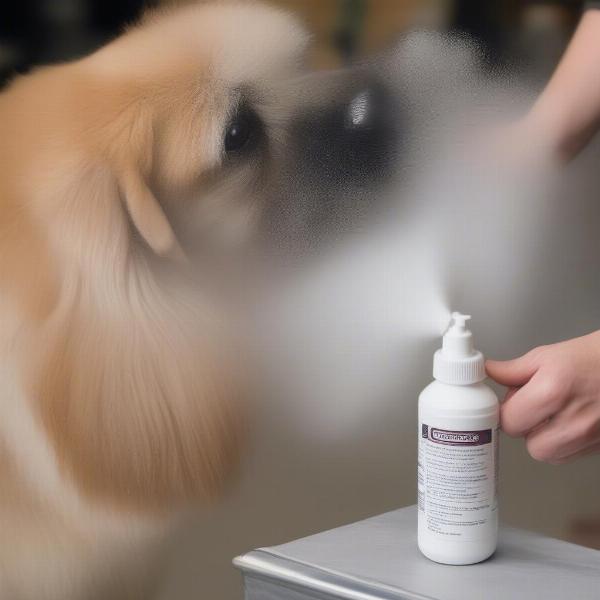Karbadust for dogs is a topic that often raises questions and concerns among pet owners. This guide aims to provide clear, factual information about Karbadust, its uses, potential risks, and safer alternatives for managing external parasites in dogs. While Karbadust isn’t commonly recommended by veterinarians today due to potential toxicity concerns, understanding its history and why safer, more effective options are available is essential for responsible pet ownership.
What is Karbadust and Why is it Less Popular Now?
Karbadust, a carbaryl-based insecticide powder, was once a common treatment for fleas, ticks, and mites on dogs. It worked by disrupting the nervous system of these parasites, ultimately leading to their death. However, over time, concerns arose regarding its potential toxicity to dogs, especially with repeated or excessive use. Furthermore, the development of newer, safer, and more effective parasiticides has led to a decline in Karbadust’s popularity.
 Karbadust powder being applied to a dog
Karbadust powder being applied to a dog
Carbaryl, the active ingredient in Karbadust, can cause a range of adverse reactions in dogs if ingested or absorbed through the skin, particularly in smaller breeds or puppies. These reactions can include vomiting, diarrhea, excessive salivation, tremors, and difficulty breathing. In severe cases, carbaryl poisoning can be fatal.
Safer Alternatives to Karbadust for Flea and Tick Control
Fortunately, there are many safer and more effective alternatives to Karbadust available today for flea and tick control in dogs. These include:
- Topical Treatments: These are applied directly to the dog’s skin and offer long-lasting protection against fleas and ticks. Many popular brands are available, offering varying durations of effectiveness.
- Oral Medications: These are given by mouth and work systemically to kill fleas and ticks. They often provide rapid and effective control.
- Flea and Tick Collars: These collars release insecticide over time, providing continuous protection against parasites. Ensure the collar is specifically designed for dogs and used according to the manufacturer’s instructions.
Choosing the right parasite prevention method depends on your dog’s individual needs, lifestyle, and any existing health conditions. It’s crucial to consult with your veterinarian to determine the safest and most effective option for your dog. They can advise on the appropriate product, dosage, and application frequency.
What to Do If You Suspect Carbaryl Poisoning
If you suspect your dog has been exposed to Karbadust or is exhibiting symptoms of carbaryl poisoning, seek immediate veterinary attention. Time is of the essence in these cases. Treatment may involve inducing vomiting, administering activated charcoal to absorb the toxin, and providing supportive care to manage symptoms.
Protecting Your Dog from Parasites: A Proactive Approach
Beyond using parasiticides, a proactive approach to parasite control can significantly reduce your dog’s risk of infestation. This includes:
- Regular Grooming: Frequent brushing and bathing can help remove fleas and ticks.
- Yard Maintenance: Keeping your yard clean and free of tall grass and debris can minimize tick habitats.
- Regular Veterinary Checkups: Regular checkups allow your veterinarian to detect and address parasite infestations early.
Conclusion
While Karbadust was once a common parasite treatment for dogs, safer and more effective options are available today. Consult your veterinarian to determine the best parasite prevention plan for your dog and avoid using outdated or potentially harmful products like Karbadust. By prioritizing your dog’s health and well-being, you can ensure they live a long, happy, and parasite-free life.
FAQ
- What are the signs of carbaryl poisoning in dogs? Symptoms can include vomiting, diarrhea, excessive salivation, tremors, and difficulty breathing.
- What should I do if my dog ingests Karbadust? Contact your veterinarian immediately.
- Are there any natural alternatives to Karbadust? While some natural remedies are touted for parasite control, their effectiveness is often limited. Consult your veterinarian for safe and effective options.
- How often should I treat my dog for fleas and ticks? The frequency of treatment depends on the product used and your dog’s individual needs. Consult your veterinarian for guidance.
- Can I use Karbadust on puppies? Karbadust is generally not recommended for puppies due to their increased sensitivity to the active ingredient.
- Is Karbadust safe for pregnant or lactating dogs? No, Karbadust is not recommended for pregnant or lactating dogs.
- What are the long-term effects of carbaryl exposure in dogs? Repeated or excessive exposure to carbaryl can have long-term health consequences.
ILM Dog is your trusted source for comprehensive and reliable information on dog care and wellbeing. We specialize in Breed Selection, Dog Health & Medical Care, Training & Behavior, Nutrition & Feeding, Grooming & Hygiene, and Products & Accessories. For personalized advice and expert guidance, reach out to our team at [email protected] or call us at +44 20-3965-8624. Visit ILM Dog for more valuable resources to enhance your dog’s life.